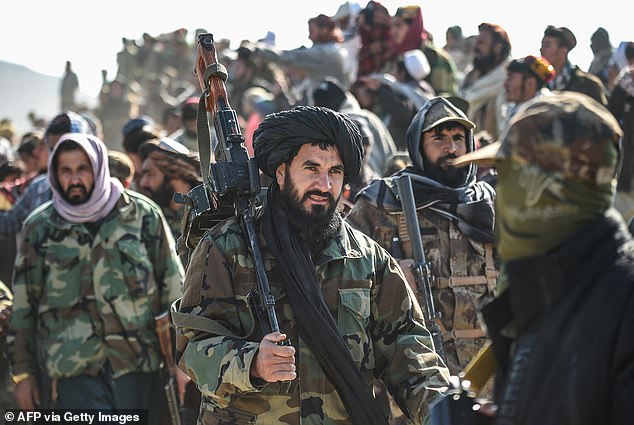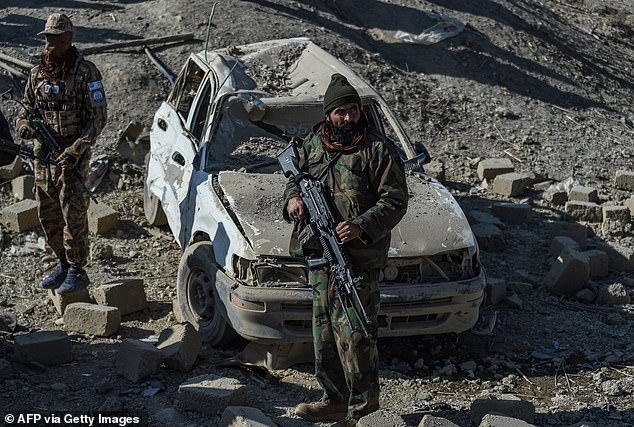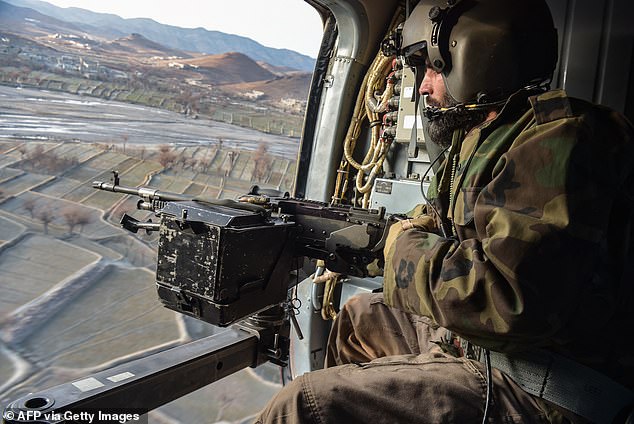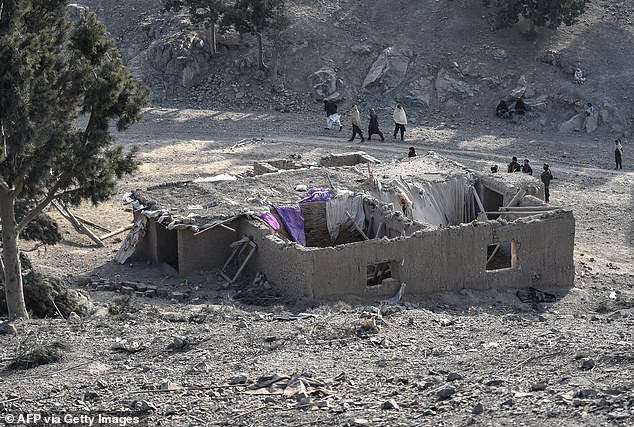Fears of all-out war between Afghanistan and Pakistan as Taliban warn ‘we don’t care if they have nuclear weapons’ and send battalions to border as countries launch deadly attacks
Fears of an all-out war between Afghanistan and Pakistan are growing after the Taliban deployed troops to the border as the two countries continue to carry out deadly attacks.
The Afghan Taliban have launched a series of devastating artillery attacks on Pakistani military checkpoints along the tense border, raising fears of a full-blown conflict between the two neighbors.
The hardline Islamist group boasted of destroying “several” Pakistani positions and mobilizing battalions of fighters to face any retaliation from Islamabad in a chilling show of force.
The attacks are in response to Pakistani airstrikes on the Tehreek-e-Taliban Pakistan (TTP), an ally of the Afghan Taliban, in eastern Afghanistan.
Local Afghan officials claimed the attacks killed 46 civilians, including women and children, further escalating tensions.
In response, the Afghan government promised “retaliatory measures” on Saturday, with Afghan Taliban forces claiming to have attacked “several points” near the Durand Line, the disputed border between the two nations.
In a chilling statement to The TelegraphTaliban officials said they were prepared for the conflict with Pakistan to escalate further, raising fears that the region is moving closer to war.
“We don’t care if they have a nuclear bomb – we have faith and know that God is with us,” a senior Taliban official said.
The Afghan Taliban have launched a series of devastating artillery attacks on Pakistani military checkpoints along the tense border.

Taliban security personnel gather at the site two days after airstrikes by Pakistan in the Barmal district of eastern Paktika province on December 26, 2024

Airstrikes in Pakistan in an eastern border area of Afghanistan killed 46 civilians, the Taliban government said on December 25.

A Taliban security personnel stands guard from a helicopter two days after the air strikes by Pakistan
The Taliban have vowed to stand firm against any retaliatory attack from Pakistan, with the Afghan Ministry of Defense on high alert and additional troops ready to fortify the unstable border.
The Taliban’s foreign minister warned Pakistan this weekend, urging Pakistani authorities not to “underestimate our capabilities.”
“We will not forget Pakistan’s goodwill during the time of jihad, but we will not forget Pakistan’s aggression on Afghan soil today,” Amir Khan Muttaqi said.
“I have a message for the Pakistani authorities: do not think we are weak and do not attack us,” he added. ‘We are having a hard time, but we are very brave.’
But in a dramatic twist, Islamabad finds itself at odds with the group it once supported.
Pakistan had covertly supported the Afghan Taliban during the US-led war in Afghanistan, hoping to secure influence in the region.
But the fallout from the Taliban’s return to power has intensified Pakistan’s long-running battle with the TTP.
The TTP, emboldened by weapons allegedly funneled to them by the Afghan Taliban – many of which were seized by retreating US troops – has launched a wave of deadly attacks on Pakistani territory since the Taliban took over Kabul in 2021 .
Pakistan’s military leaders had bet that their former allies would help suppress the TTP, but instead they now face a brutal double threat.
“The Mujahideen successfully attacked and destroyed several enemy positions and caused significant damage,” a senior Taliban Defense Ministry official said, referring to last weekend’s attacks.
“Several areas were targeted by artillery, and we destroyed many of their checkpoints and equipment. They need to know that they cannot violate our sovereignty.”
‘Several battalions have been sent to the border, and we are prepared for anything. We did not kick out NATO just to be intimidated or humiliated by the Punjabis,” he said.

A Pakistani security official said the bombing targeted ‘terrorist hideouts’

The Taliban’s foreign minister warned Pakistan this weekend, urging Pakistani authorities ‘not to underestimate our capabilities’

The Taliban have vowed to stand firm against any retaliatory attack from Pakistan, with the Afghan Ministry of Defense on high alert and additional troops ready to fortify the unstable border.
Pakistan has accused Kabul of allowing militants to cross the border unchecked, a charge strongly denied by the Afghan Taliban, who insist they have not allowed any attacks from their territory.
The escalating crisis has caused international alarm. Russia intervened on Sunday, urging both sides to show restraint.
Russian Foreign Ministry spokeswoman Maria Zakharova said Moscow was “deeply concerned” about the situation and called for a “constructive dialogue” to defuse tensions.
But there are major signs of further conflict.
A Taliban Interior Ministry official revealed to the newspaper that Kabul was evaluating its next steps in case of more Pakistani attacks.
Meanwhile, social media accounts linked to the Taliban are sharing videos of troop movements near the border in an apparent show of force.
One striking clip shows Soviet-era tanks, remnants of the USSR’s failed invasion of Afghanistan, being transported to the front lines.
Another video shows NATO military vehicles, left behind during the US withdrawal, now reportedly on their way to reinforce Taliban forces.
In a defiant official statement, the Taliban claimed responsibility for attacking “several points serving as centers and hideouts for malign elements and their supporters” across the border in Pakistan.
The group’s use of the term “hypothetical line” referred to the long-disputed border and rejected Pakistan’s territorial claims.
The situation remains volatile, with both sides bracing for further escalation in a dangerous showdown that threatens to destabilize the region.
The terror group has historically had strong ties with Pakistan and analysts believe that without the country’s support, the Taliban’s takeover of Afghanistan would have been unlikely.
But relations between the two neighbors have deteriorated in the past three years and numerous cross-border clashes have broken out.
